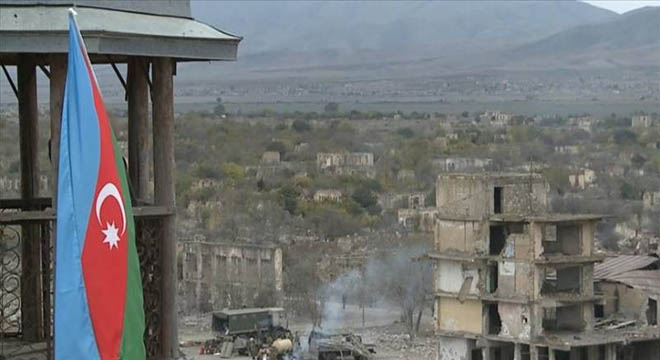The total material damage Armenia inflicted on Azerbaijan amounts to more than $50 billion, Azerbaijan’s ambassador to Turkey told Anadolu Agency in an interview.
“Apart from the occupation of Nagorno-Karabakh and seven adjacent regions, and war crimes committed during the wars, Armenia violated the international law among others through the efforts of the destruction of cultural heritage, ecocides, and theft of our natural wealth,” Khazar Ibrahim said.
The two former Soviet republics experienced tense relations for three decades after the Armenian military started occupying Nagorno-Karabakh, also known as Upper Karabakh, a territory internationally recognized as part of Azerbaijan, and seven adjacent regions in 1991.
When new clashes erupted last September, the Armenian army launched attacks on civilians and Azerbaijani forces and violated several humanitarian cease-fire agreements.
During the six weeks of conflict, Azerbaijan liberated several cities and nearly 300 settlements and villages from occupation after almost 30 years.
“After the liberation, the sceneries in our historical lands seemed devastated,” Ibrahim said.
Before the recent conflict, about 20% of Azerbaijan’s territory had been under illegal Armenian occupation for nearly 30 years.
According to estimates, besides Azerbaijan’s residential and administrative buildings, 700 historic and cultural monuments, 927 libraries, 808 cultural centers, 85 music and art schools, 22 museums with over 100,000 artefacts, four art galleries, four theatres, and two concert halls were damaged or destroyed by Armenian forces over the last three decades, the envoy said.
He mentioned that Azerbaijan has “large-scale post-war reconstruction plans” for restoring the liberated territories, adding that demining processes have been launched to realize these plans safely.
He stated that the transportation and infrastructure projects play a “crucial role” in the area, noting that in this context, right after the liberation of the city of Shusha — Karabakh’s symbolic city considered as the cultural capital of Azerbaijan — the construction of the international airport along with a new hundred kilometers highway from Fuzuli, involving three companies from Azerbaijan and Turkey, was announced.
Destruction of cultural heritage
Reconstruction in the liberated territories is arranged to reflect the historical and authentic heritage of the region while embracing modern technological innovations, Ibrahim said.
Modern smart cities built with cutting-edge technologies, infrastructure projects, agricultural activities, and energy supplies based on renewable resources are among the developmental goals of the region, he added.
The head of the diplomatic mission highlighted that apart from Azerbaijan, the companies from Turkey, the UK, Italy, Hungary, Japan, Israel, Iran, and other states have already shown interest in contributing to the recently liberated lands.
He went on to say that as a result of the tripartite agreement signed in last November, a corridor to Azerbaijan’s landlocked exclave Nakhchivan through Armenia “engendered novel opportunities” for the regional cooperation.
The two countries signed a Russian-brokered agreement on Nov. 10 to end the fighting and work toward a comprehensive resolution.
Azerbaijan plans to construct a highway and railway to Nakhchivan that will directly connect the country to “brotherly” Turkey, the envoy said.
Furthermore, Ibrahim said the restoration of the cultural and religious monuments destroyed and desecrated by Armenian forces during the occupation period has a “salient place” on the reconstruction agenda.
“Contrary to some popular disillusionment, Azerbaijan as a multi-confessional country will be involved in the restoration of cultural heritage belonging not only to Muslims but also Christians that have also been looted by Armenians,” he said.
“Indeed, there is too much work ahead in order to overcome the destructive burden of the occupation and it may require serious reconstruction efforts to make it possible for the internally displaced people to get back home. Only after the developmental plan is accomplished may the people return to their homes.”
‘International community turned blind eye to real facts’
Ibrahim said that as seen in previous attacks of the Armenian forces against Azerbaijani people, Armenia also continued “committing war crimes” in the recent 44-days war too.
“The Armenian army, which was incapacitated by our armed forces, did not hesitate to target civilians in cities that were not in the conflict zone; as a result, 100 of our citizens were killed, 416 were injured, and serious damage to civilian infrastructure was caused,” he said.
He stated that the officials of the Armenian government “acknowledged their involvement” in the civilian attacks “once again,” adding that it was “another turn of events” happening in front of the world with its evidence and confessions.
Ibrahim said that during the second Nagorno-Karabakh war, or Patriotic War, some countries, international organizations, and media outlets “turned a blind eye” to the real facts and “preferred the fabricated ones.”
“Certainly, infiltrating into the countries and societies where Armenian diaspora enrooted itself for decades and has omnipresence in almost all power circles is difficult yet achievable,” he said.
“In order to be heard, we need to perpetuate our work on reaching the world with the truth and destruct the prejudicial illusion constructed about the ‘victimhood’ of Armenians and ‘savageness’ of Turks.”
Quoting George Washington, “Truth will ultimately prevail where there are pains to bring it to light,” Ibrahim said in this regard they need “nothing more than really being heard and seen,” which require more efficient diaspora activities among not only the ones who like they, but also among those who “ignore and even have prejudices” to the Azerbaijani nation.
Follow the PNI Facebook page for the latest news and updates.









